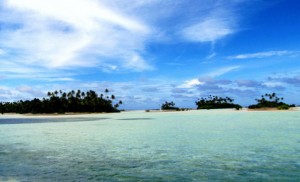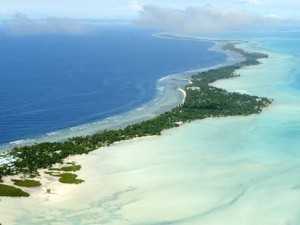Threatened with the prospect of being washed away by rising tides, the President of Kiribati has started buying up land in Fiji as an alternative refuge for his population
The President of Kiribati, Anote Tong, has taken action against the growing threat of rising sea levels, purchasing of 20 km² of land on the Fijian island of Vanua Levu with a view to creating an alternative refuge for the 110,000 residents of the low-lying Pacific island nation.
As one of the world’s lowest lying island nations, Kiribati has the dubious honour of being amongst the world’s first countries to experience the impact of climate change. Located an average of just two metres above sea level, even marginal increases in sea levels pose a grave threat for the republic.
Currently rising at a level of 1.2 centimetres per year (four times faster than the global average), the waters surrounding Kiribati already present a daily challenge for its people. Floods of increasing severity regularly destroy houses, crops, and businesses alike – leading climate change experts to predict that – as soon as the year 2100 – the majority of the country’s 33 islands will be wiped from the map completely.
Faced with the possibility of being washed off the map completely, Kiribati’s political elite was forced to act – completing the transaction of a 20 km² of piece of densely forested land in Vanua Levu for a reported USD 8.77 million. Whilst initially expected to be used to guarantee the nation’s food security and to extract earth for sea defences, Tong has already stated his intent to do whatever it takes to save his countrymen:
“We would hope not to put everyone on [this] one piece of land, but if it became absolutely necessary, yes, we could do it,” President Tong explained, in a recent interview with the Associated Press. Tong’s bold action looks certain to shine the spotlight on what is by no means an isolated issue amongst the world’s small island states and low-lying coastal communities.
For Kiribati, it seems the damage is already irreversible. “Whatever is agreed between the US and China [the two largest sources of CO2 emissions], it will not have a bearing on our future. Already, it’s too late for us,” explained Tong in an interview with CNN. “And so we are the canary. But hopefully, that experience will send a very strong message that we might be on the frontline today, but others will be on the frontline next.”
And indeed, whilst Kiribati is the first country to take action against climate change in such a daring form, it was actually Mohamed Nasheed, the former President of the Maldives, who first explored the idea of purchasing foreign land in anticipation of being submerged, investigating options in Sri Lanka and India as far back as 2009 before being ousted from power.
According to Ronald Jumeau, UN ambassador for the Seychelles, Kiribati will by no means be the last forced to take such desperate measures: “Kiribati is just the first on a list which could get longer as time passes,” he explained. With scientists predicting that the number of people forced to leave their homes due to climate change could climb as high as 700 million by 2050, it’s hard to disagree.
Have your say: Will Kiribati’s bold move finally be enough to get the world to wake up to the effects of climate change? Drop us a line on our Facebook, Twitter and Google+ pages and let us know your thoughts.




